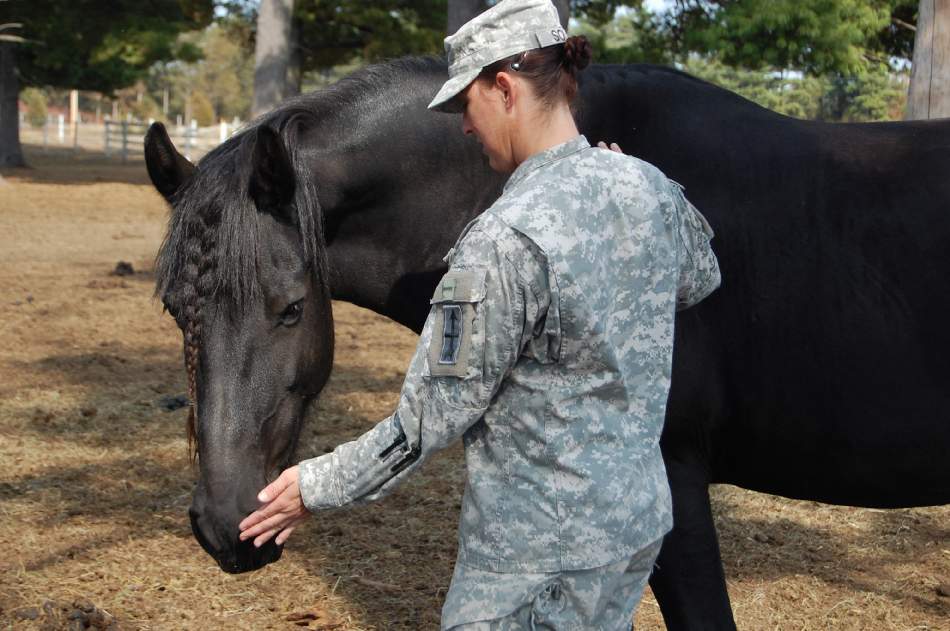
Equine therapy has emerged as a promising treatment option for veterans struggling with addiction. This post explores the benefits of equine therapy specifically for addicted veterans, highlighting how interactions with horses can aid in the recovery process. Through fostering responsibility, building trust, and promoting emotional healing, equine therapy offers a unique and effective approach to addressing addiction among veterans.
What is Equine Therapy and What are the Benefits
Equine therapy, also known as horse therapy or horse-assisted therapy, is a form of experiential therapy that involves interactions between individuals and horses in a therapeutic setting. In equine therapy sessions, individuals engage in a variety of activities with horses, such as grooming, feeding, leading, and riding, under the guidance of trained professionals. The primary goal of equine therapy is to promote emotional growth, enhance self-awareness, and improve mental health by leveraging the unique bond between humans and horses.
Benefits of Equine Therapy: Emotional Regulation: Interacting with horses can help individuals regulate their emotions and reduce stress and anxiety. Horses are sensitive animals that can mirror and respond to human emotions, providing immediate feedback and enabling individuals to become more aware of their emotional states. Through activities such as grooming and leading horses, individuals can learn to manage their emotions, develop self-control, and improve emotional regulation skills.
Building Trust and Confidence: Working with horses can help individuals build trust and confidence in themselves and others. Horses are non-judgmental beings that respond to authentic communication and behavior, encouraging individuals to develop trust-based relationships. By successfully communicating with and gaining the trust of a horse, individuals can boost their self-esteem, improve their self-confidence, and strengthen their interpersonal skills.
Enhancing Communication Skills: Equine therapy can enhance communication skills by requiring individuals to effectively communicate with the horses and the therapy team. Horses communicate through body language, tone of voice, and energy, teaching individuals the importance of clear and assertive communication. Through practicing communication techniques with horses, individuals can improve their verbal and non-verbal communication skills, which can translate into better communication in their personal and professional relationships.
Stress Reduction: Spending time with horses in a peaceful and natural environment can help individuals reduce stress and promote relaxation. The rhythmic movement of riding a horse, the calming presence of the animals, and the serene surroundings of a stable or pasture can have a soothing effect on individuals’ nervous systems. Engaging in equine therapy activities can provide a therapeutic escape from daily stressors and contribute to overall emotional well-being.
Physical Benefits: In addition to the emotional and psychological benefits, equine therapy can also offer physical advantages. Activities such as grooming, leading, and riding horses require physical exertion and coordination, leading to improved balance, strength, and motor skills. For individuals with physical disabilities or injuries, working with horses can serve as a form of physical therapy and rehabilitation, promoting physical health and well-being.
What Causes Addiction in Veterans
Veterans are particularly vulnerable to addiction due to the unique challenges they face both during and after their service. Understanding the underlying causes of addiction in veterans is crucial in order to provide them with the support and resources they need to overcome their struggles. The following explores the various factors that contribute to addiction in veterans, including the impact of trauma, mental health issues, and social isolation. By examining these underlying causes, we can gain a better understanding of why addiction is prevalent among veterans and how we can effectively address this issue.
Trauma: Many veterans experience traumatic events during their time in the military, such as combat exposure, witnessing violence, or losing comrades. These traumatic experiences can lead to the development of post-traumatic stress disorder (PTSD), which is a significant risk factor for addiction. Veterans may turn to drugs or alcohol as a way to cope with the painful memories and emotions associated with their trauma.
Example: A veteran who served in Iraq and witnessed the death of his fellow soldiers may develop PTSD and subsequently turn to alcohol to numb his feelings of guilt and sadness.
Mental Health Issues: Veterans are also at a higher risk of experiencing mental health issues such as depression, anxiety, and mood disorders. These mental health conditions can contribute to the development of addiction, as individuals may use substances as a form of self-medication to alleviate their symptoms.
Example: A veteran who struggles with depression after returning home from deployment may turn to prescription painkillers to numb the emotional pain he is experiencing.
Social Isolation: Transitioning back to civilian life can be challenging for veterans, as they may struggle to re-establish connections with family and friends, find employment, or integrate into their communities. This sense of social isolation and alienation can increase the likelihood of veterans turning to substances as a way to cope with feelings of loneliness and disconnection.
Example: A veteran who feels disconnected from his family and unable to find stable employment may turn to heroin as a way to escape his feelings of hopelessness and despair.
Addiction in veterans is a complex issue that is influenced by a variety of factors, including trauma, mental health issues, and social isolation. By addressing these underlying causes and providing veterans with access to comprehensive support services, we can help them overcome their struggles with addiction and achieve a healthier, more fulfilling life.



Equine Therapy for Addicted Veterans
Veterans grappling with addiction often face challenges in finding effective treatment options that cater to their unique needs. Equine therapy has shown promise in providing a holistic and engaging approach to addiction recovery for veterans. By leveraging the therapeutic bond between veterans and horses, equine therapy can offer a path towards healing and sobriety. The following delves into the advantages of equine therapy for addicted veterans, emphasizing the physical, emotional, and psychological benefits it provides.
Foster Responsibility and Discipline: Addicted veterans often struggle with feelings of purposelessness and lack of structure in their lives. Equine therapy can help instill a sense of responsibility and discipline in veterans by requiring them to care for and interact with the horses. This hands-on approach encourages veterans to adhere to a routine, prioritize tasks, and develop a sense of accountability. Through the daily care of the horses, veterans can experience the satisfaction of fulfilling responsibilities and nurturing a living being, fostering a sense of purpose and accomplishment that is crucial in the recovery process.
Build Trust and Connection: Addicted veterans may have difficulties trusting others due to past traumas or experiences. Equine therapy offers a safe and non-judgmental space for veterans to build trust and form connections with the horses. Horses are perceptive animals that respond to human emotions, providing veterans with immediate feedback on their behaviors and interactions. By developing a bond with the horses based on trust and mutual understanding, veterans can learn to trust themselves and others, which is essential for overcoming addiction and rebuilding healthy relationships.
Promote Emotional Healing and Coping Skills: Addiction is often rooted in underlying emotional pain, trauma, or unresolved issues. Equine therapy can facilitate emotional healing for addicted veterans by providing a therapeutic outlet for expressing and processing their emotions. Interacting with horses can help veterans regulate their emotions, reduce stress and anxiety, and develop healthy coping skills. The unconditional acceptance and companionship offered by the horses can also alleviate feelings of isolation and shame, creating a supportive environment for veterans to explore and address their emotional struggles.
In Conclusion
Equine therapy holds significant promise as a valuable treatment modality for addicted veterans, offering a unique blend of physical, emotional, and psychological benefits that support the recovery process. By incorporating equine therapy into addiction treatment programs for veterans, we can provide a holistic and enriching approach that addresses the multifaceted needs of individuals struggling with addiction. Through fostering responsibility, building trust, and promoting emotional healing, equine therapy empowers addicted veterans to embark on a journey towards sobriety, self-discovery, and overall well-being.
Equine-assisted therapy at Magnolia Ranch Recovery offers a unique and effective approach to supporting veterans in their recovery from addiction. By providing veterans with opportunities to connect with nature, build trust and communication skills, regulate their emotions, and cultivate a sense of purpose, equine-assisted therapy can play a valuable role in promoting healing and resilience among veterans. It is essential that we continue to explore and expand the use of innovative therapeutic approaches like equine-assisted therapy to support the well-being of our veterans and honor their service.
If you or someone you know is struggling with a chemical dependency issue reach out to Genesis Medical Detox or Magnolia Ranch Recovery today and get started on the path to long-term recovery.


















